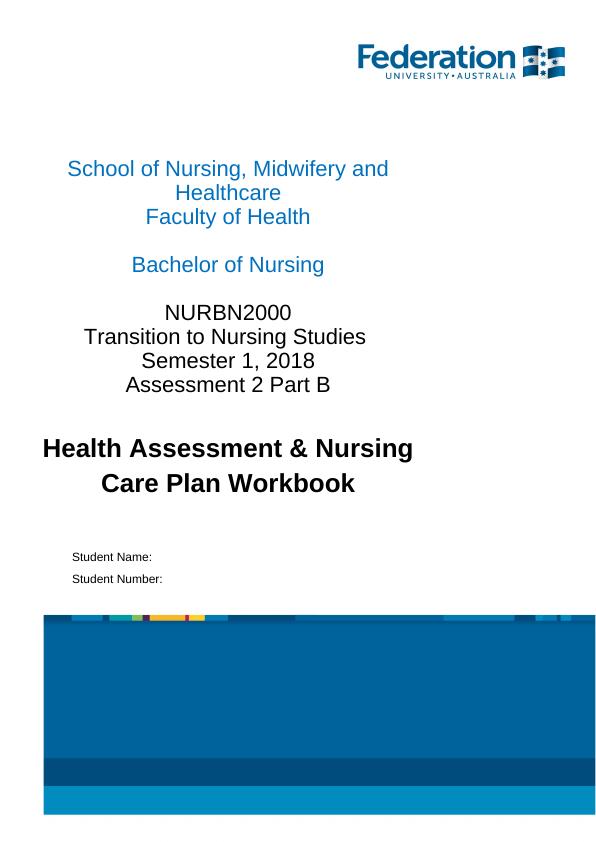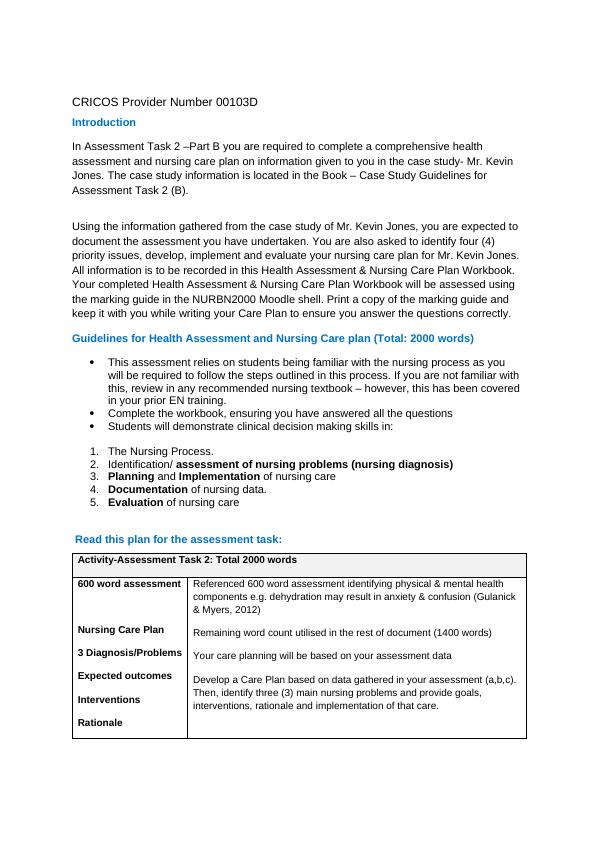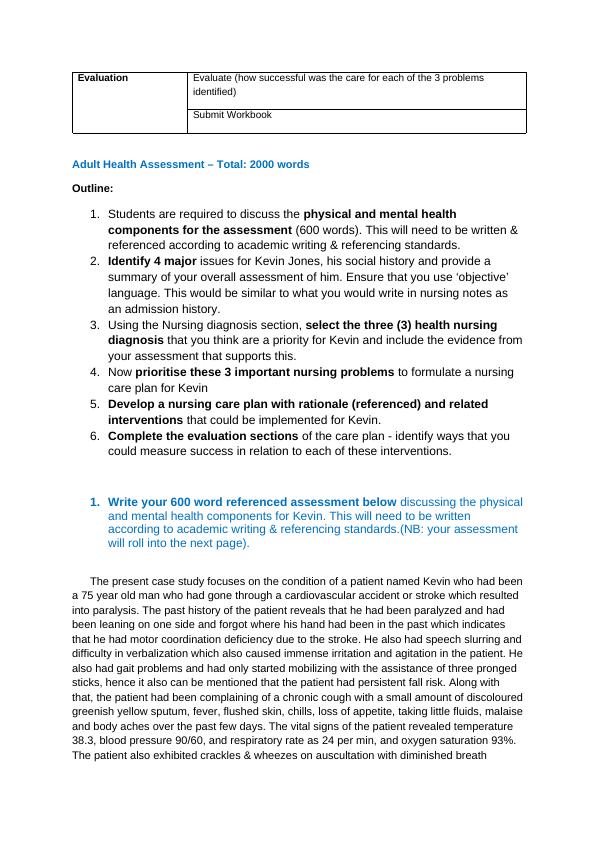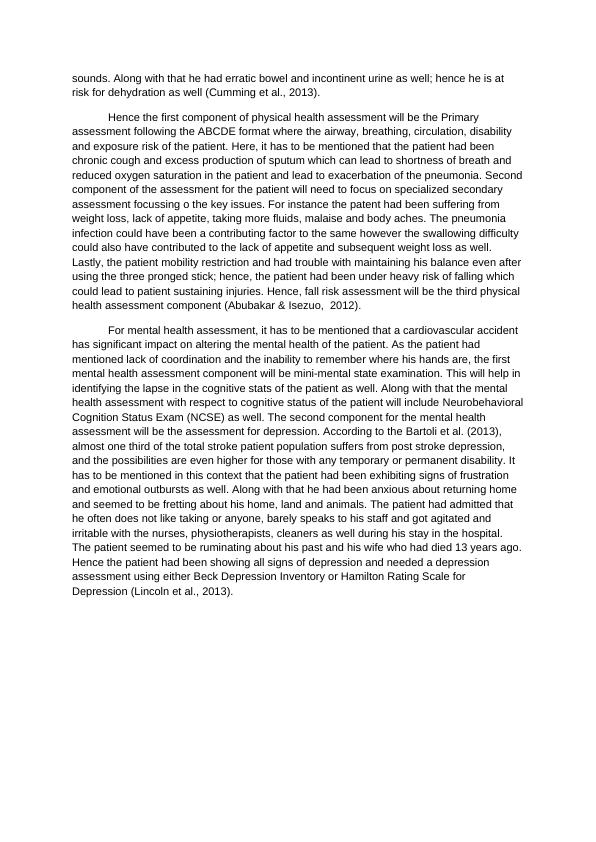Health Assessment & Nursing Care Plan Workbook for NURBN2000
Complete a comprehensive health assessment and nursing care plan based on a case study of Mr. Kevin Jones.
18 Pages4476 Words443 Views
Added on 2023-06-12
About This Document
This workbook is for NURBN2000 students to complete a comprehensive health assessment and nursing care plan on information given to you in the case study- Mr. Kevin Jones. The workbook includes guidelines for health assessment and nursing care plan, adult health assessment, identifying nursing problems, and nursing care plan.
Health Assessment & Nursing Care Plan Workbook for NURBN2000
Complete a comprehensive health assessment and nursing care plan based on a case study of Mr. Kevin Jones.
Added on 2023-06-12
ShareRelated Documents
Student Name:
Student Number:
School of Nursing, Midwifery and
Healthcare
Faculty of Health
Bachelor of Nursing
NURBN2000
Transition to Nursing Studies
Semester 1, 2018
Assessment 2 Part B
Health Assessment & Nursing
Care Plan Workbook
Student Number:
School of Nursing, Midwifery and
Healthcare
Faculty of Health
Bachelor of Nursing
NURBN2000
Transition to Nursing Studies
Semester 1, 2018
Assessment 2 Part B
Health Assessment & Nursing
Care Plan Workbook

CRICOS Provider Number 00103D
Introduction
In Assessment Task 2 –Part B you are required to complete a comprehensive health
assessment and nursing care plan on information given to you in the case study- Mr. Kevin
Jones. The case study information is located in the Book – Case Study Guidelines for
Assessment Task 2 (B).
Using the information gathered from the case study of Mr. Kevin Jones, you are expected to
document the assessment you have undertaken. You are also asked to identify four (4)
priority issues, develop, implement and evaluate your nursing care plan for Mr. Kevin Jones.
All information is to be recorded in this Health Assessment & Nursing Care Plan Workbook.
Your completed Health Assessment & Nursing Care Plan Workbook will be assessed using
the marking guide in the NURBN2000 Moodle shell. Print a copy of the marking guide and
keep it with you while writing your Care Plan to ensure you answer the questions correctly.
Guidelines for Health Assessment and Nursing Care plan (Total: 2000 words)
This assessment relies on students being familiar with the nursing process as you
will be required to follow the steps outlined in this process. If you are not familiar with
this, review in any recommended nursing textbook – however, this has been covered
in your prior EN training.
Complete the workbook, ensuring you have answered all the questions
Students will demonstrate clinical decision making skills in:
1. The Nursing Process.
2. Identification/ assessment of nursing problems (nursing diagnosis)
3. Planning and Implementation of nursing care
4. Documentation of nursing data.
5. Evaluation of nursing care
Read this plan for the assessment task:
Activity-Assessment Task 2: Total 2000 words
600 word assessment
Nursing Care Plan
3 Diagnosis/Problems
Expected outcomes
Interventions
Rationale
Referenced 600 word assessment identifying physical & mental health
components e.g. dehydration may result in anxiety & confusion (Gulanick
& Myers, 2012)
Remaining word count utilised in the rest of document (1400 words)
Your care planning will be based on your assessment data
Develop a Care Plan based on data gathered in your assessment (a,b,c).
Then, identify three (3) main nursing problems and provide goals,
interventions, rationale and implementation of that care.
Introduction
In Assessment Task 2 –Part B you are required to complete a comprehensive health
assessment and nursing care plan on information given to you in the case study- Mr. Kevin
Jones. The case study information is located in the Book – Case Study Guidelines for
Assessment Task 2 (B).
Using the information gathered from the case study of Mr. Kevin Jones, you are expected to
document the assessment you have undertaken. You are also asked to identify four (4)
priority issues, develop, implement and evaluate your nursing care plan for Mr. Kevin Jones.
All information is to be recorded in this Health Assessment & Nursing Care Plan Workbook.
Your completed Health Assessment & Nursing Care Plan Workbook will be assessed using
the marking guide in the NURBN2000 Moodle shell. Print a copy of the marking guide and
keep it with you while writing your Care Plan to ensure you answer the questions correctly.
Guidelines for Health Assessment and Nursing Care plan (Total: 2000 words)
This assessment relies on students being familiar with the nursing process as you
will be required to follow the steps outlined in this process. If you are not familiar with
this, review in any recommended nursing textbook – however, this has been covered
in your prior EN training.
Complete the workbook, ensuring you have answered all the questions
Students will demonstrate clinical decision making skills in:
1. The Nursing Process.
2. Identification/ assessment of nursing problems (nursing diagnosis)
3. Planning and Implementation of nursing care
4. Documentation of nursing data.
5. Evaluation of nursing care
Read this plan for the assessment task:
Activity-Assessment Task 2: Total 2000 words
600 word assessment
Nursing Care Plan
3 Diagnosis/Problems
Expected outcomes
Interventions
Rationale
Referenced 600 word assessment identifying physical & mental health
components e.g. dehydration may result in anxiety & confusion (Gulanick
& Myers, 2012)
Remaining word count utilised in the rest of document (1400 words)
Your care planning will be based on your assessment data
Develop a Care Plan based on data gathered in your assessment (a,b,c).
Then, identify three (3) main nursing problems and provide goals,
interventions, rationale and implementation of that care.

Evaluation Evaluate (how successful was the care for each of the 3 problems
identified)
Submit Workbook
Adult Health Assessment – Total: 2000 words
Outline:
1. Students are required to discuss the physical and mental health
components for the assessment (600 words). This will need to be written &
referenced according to academic writing & referencing standards.
2. Identify 4 major issues for Kevin Jones, his social history and provide a
summary of your overall assessment of him. Ensure that you use ‘objective’
language. This would be similar to what you would write in nursing notes as
an admission history.
3. Using the Nursing diagnosis section, select the three (3) health nursing
diagnosis that you think are a priority for Kevin and include the evidence from
your assessment that supports this.
4. Now prioritise these 3 important nursing problems to formulate a nursing
care plan for Kevin
5. Develop a nursing care plan with rationale (referenced) and related
interventions that could be implemented for Kevin.
6. Complete the evaluation sections of the care plan - identify ways that you
could measure success in relation to each of these interventions.
1. Write your 600 word referenced assessment below discussing the physical
and mental health components for Kevin. This will need to be written
according to academic writing & referencing standards.(NB: your assessment
will roll into the next page).
The present case study focuses on the condition of a patient named Kevin who had been
a 75 year old man who had gone through a cardiovascular accident or stroke which resulted
into paralysis. The past history of the patient reveals that he had been paralyzed and had
been leaning on one side and forgot where his hand had been in the past which indicates
that he had motor coordination deficiency due to the stroke. He also had speech slurring and
difficulty in verbalization which also caused immense irritation and agitation in the patient. He
also had gait problems and had only started mobilizing with the assistance of three pronged
sticks, hence it also can be mentioned that the patient had persistent fall risk. Along with
that, the patient had been complaining of a chronic cough with a small amount of discoloured
greenish yellow sputum, fever, flushed skin, chills, loss of appetite, taking little fluids, malaise
and body aches over the past few days. The vital signs of the patient revealed temperature
38.3, blood pressure 90/60, and respiratory rate as 24 per min, and oxygen saturation 93%.
The patient also exhibited crackles & wheezes on auscultation with diminished breath
identified)
Submit Workbook
Adult Health Assessment – Total: 2000 words
Outline:
1. Students are required to discuss the physical and mental health
components for the assessment (600 words). This will need to be written &
referenced according to academic writing & referencing standards.
2. Identify 4 major issues for Kevin Jones, his social history and provide a
summary of your overall assessment of him. Ensure that you use ‘objective’
language. This would be similar to what you would write in nursing notes as
an admission history.
3. Using the Nursing diagnosis section, select the three (3) health nursing
diagnosis that you think are a priority for Kevin and include the evidence from
your assessment that supports this.
4. Now prioritise these 3 important nursing problems to formulate a nursing
care plan for Kevin
5. Develop a nursing care plan with rationale (referenced) and related
interventions that could be implemented for Kevin.
6. Complete the evaluation sections of the care plan - identify ways that you
could measure success in relation to each of these interventions.
1. Write your 600 word referenced assessment below discussing the physical
and mental health components for Kevin. This will need to be written
according to academic writing & referencing standards.(NB: your assessment
will roll into the next page).
The present case study focuses on the condition of a patient named Kevin who had been
a 75 year old man who had gone through a cardiovascular accident or stroke which resulted
into paralysis. The past history of the patient reveals that he had been paralyzed and had
been leaning on one side and forgot where his hand had been in the past which indicates
that he had motor coordination deficiency due to the stroke. He also had speech slurring and
difficulty in verbalization which also caused immense irritation and agitation in the patient. He
also had gait problems and had only started mobilizing with the assistance of three pronged
sticks, hence it also can be mentioned that the patient had persistent fall risk. Along with
that, the patient had been complaining of a chronic cough with a small amount of discoloured
greenish yellow sputum, fever, flushed skin, chills, loss of appetite, taking little fluids, malaise
and body aches over the past few days. The vital signs of the patient revealed temperature
38.3, blood pressure 90/60, and respiratory rate as 24 per min, and oxygen saturation 93%.
The patient also exhibited crackles & wheezes on auscultation with diminished breath

sounds. Along with that he had erratic bowel and incontinent urine as well; hence he is at
risk for dehydration as well (Cumming et al., 2013).
Hence the first component of physical health assessment will be the Primary
assessment following the ABCDE format where the airway, breathing, circulation, disability
and exposure risk of the patient. Here, it has to be mentioned that the patient had been
chronic cough and excess production of sputum which can lead to shortness of breath and
reduced oxygen saturation in the patient and lead to exacerbation of the pneumonia. Second
component of the assessment for the patient will need to focus on specialized secondary
assessment focussing o the key issues. For instance the patent had been suffering from
weight loss, lack of appetite, taking more fluids, malaise and body aches. The pneumonia
infection could have been a contributing factor to the same however the swallowing difficulty
could also have contributed to the lack of appetite and subsequent weight loss as well.
Lastly, the patient mobility restriction and had trouble with maintaining his balance even after
using the three pronged stick; hence, the patient had been under heavy risk of falling which
could lead to patient sustaining injuries. Hence, fall risk assessment will be the third physical
health assessment component (Abubakar & Isezuo, 2012).
For mental health assessment, it has to be mentioned that a cardiovascular accident
has significant impact on altering the mental health of the patient. As the patient had
mentioned lack of coordination and the inability to remember where his hands are, the first
mental health assessment component will be mini-mental state examination. This will help in
identifying the lapse in the cognitive stats of the patient as well. Along with that the mental
health assessment with respect to cognitive status of the patient will include Neurobehavioral
Cognition Status Exam (NCSE) as well. The second component for the mental health
assessment will be the assessment for depression. According to the Bartoli et al. (2013),
almost one third of the total stroke patient population suffers from post stroke depression,
and the possibilities are even higher for those with any temporary or permanent disability. It
has to be mentioned in this context that the patient had been exhibiting signs of frustration
and emotional outbursts as well. Along with that he had been anxious about returning home
and seemed to be fretting about his home, land and animals. The patient had admitted that
he often does not like taking or anyone, barely speaks to his staff and got agitated and
irritable with the nurses, physiotherapists, cleaners as well during his stay in the hospital.
The patient seemed to be ruminating about his past and his wife who had died 13 years ago.
Hence the patient had been showing all signs of depression and needed a depression
assessment using either Beck Depression Inventory or Hamilton Rating Scale for
Depression (Lincoln et al., 2013).
risk for dehydration as well (Cumming et al., 2013).
Hence the first component of physical health assessment will be the Primary
assessment following the ABCDE format where the airway, breathing, circulation, disability
and exposure risk of the patient. Here, it has to be mentioned that the patient had been
chronic cough and excess production of sputum which can lead to shortness of breath and
reduced oxygen saturation in the patient and lead to exacerbation of the pneumonia. Second
component of the assessment for the patient will need to focus on specialized secondary
assessment focussing o the key issues. For instance the patent had been suffering from
weight loss, lack of appetite, taking more fluids, malaise and body aches. The pneumonia
infection could have been a contributing factor to the same however the swallowing difficulty
could also have contributed to the lack of appetite and subsequent weight loss as well.
Lastly, the patient mobility restriction and had trouble with maintaining his balance even after
using the three pronged stick; hence, the patient had been under heavy risk of falling which
could lead to patient sustaining injuries. Hence, fall risk assessment will be the third physical
health assessment component (Abubakar & Isezuo, 2012).
For mental health assessment, it has to be mentioned that a cardiovascular accident
has significant impact on altering the mental health of the patient. As the patient had
mentioned lack of coordination and the inability to remember where his hands are, the first
mental health assessment component will be mini-mental state examination. This will help in
identifying the lapse in the cognitive stats of the patient as well. Along with that the mental
health assessment with respect to cognitive status of the patient will include Neurobehavioral
Cognition Status Exam (NCSE) as well. The second component for the mental health
assessment will be the assessment for depression. According to the Bartoli et al. (2013),
almost one third of the total stroke patient population suffers from post stroke depression,
and the possibilities are even higher for those with any temporary or permanent disability. It
has to be mentioned in this context that the patient had been exhibiting signs of frustration
and emotional outbursts as well. Along with that he had been anxious about returning home
and seemed to be fretting about his home, land and animals. The patient had admitted that
he often does not like taking or anyone, barely speaks to his staff and got agitated and
irritable with the nurses, physiotherapists, cleaners as well during his stay in the hospital.
The patient seemed to be ruminating about his past and his wife who had died 13 years ago.
Hence the patient had been showing all signs of depression and needed a depression
assessment using either Beck Depression Inventory or Hamilton Rating Scale for
Depression (Lincoln et al., 2013).

End of preview
Want to access all the pages? Upload your documents or become a member.
Related Documents
NURBN2000: Transition Into Nursing Studieslg...
|29
|4062
|102
Health Assessment & Nursing Care Plan Workbook for NURBN2000lg...
|15
|4629
|193
Nursing Case Study Analysis with APA 7th Referencing Stylelg...
|11
|4066
|455
Assessment Task 1: Nursing | Mental State Examination Workbooklg...
|10
|3486
|26
HLT54115 Diploma of Nursinglg...
|9
|2294
|36
Ultrabrief Electroconvulsive Therapy For Manic Episodeslg...
|9
|2725
|16
